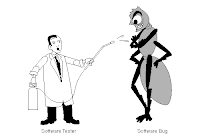THE PESTICIDE PARADOX
 In 1990, Boris Beizer, in his book Software Testing Techniques, Second Edition, coined the term pesticide paradox to describe the phenomenon that the more you test software, the more immune it becomes to your tests. The same thing happens to insects with pesticides.
In 1990, Boris Beizer, in his book Software Testing Techniques, Second Edition, coined the term pesticide paradox to describe the phenomenon that the more you test software, the more immune it becomes to your tests. The same thing happens to insects with pesticides.If you keep applying the same pesticide, the insects eventually build up resistance and the pesticide no longer works.
Software undergoing the same repetitive tests eventually builds up resistance to them.
In the spiral model of software development, the test process repeats each time around the loop. With each iteration, the software testers receive the software for testing and run their tests. Eventually, after several passes, all the bugs that those tests would find are exposed. Continuing to run them won't reveal anything new.
To overcome the pesticide paradox, software testers must continually write new and different tests to exercise different parts of the program and find more bugs.
I agree kashif, very good post :)
ReplyDelete